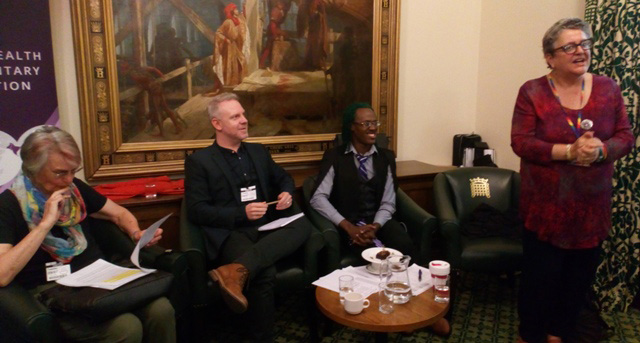 [l-r] Philippa Drew, Alistair Stewart, Glenroy Murray and Baroness Barker [photo by Debbie Ransome]
[l-r] Philippa Drew, Alistair Stewart, Glenroy Murray and Baroness Barker [photo by Debbie Ransome]
Legislation outlawing homosexuality in many countries dates back to the time of the British Empire. So is it possible to use collective expertise across the modern Commonwealth to roll back such laws?
This became a key area of focus for a panel discussion organised by the Commonwealth Parliamentary Association (CPA), titled Is the Commonwealth Stonewalling on LGBTQ+ Rights?, which took place on 9 July at the CPA Room at the Houses of Parliament, London. House of Lords spokesperson on lesbian, gay, bisexual and transsexual (LGBT) issues, Baroness Barker, hosted the event, saying that the challenge today was to “tackle that horrible, horrible legacy that we [the British] left around the world”.
“Core code”
Trustee of the LGBT human rights organisation, the Kaleidoscope Trust, Philippa Drew, said that the “core code” on same-sex relationships had originally been created for the Indian penal code, drawn up for colonial India, and then had been “cut and pasted” into legislation for other countries across the empire. Today, she said, the challenge had become how to find ways to deal with such outdated legislation – through litigation, legislative reform and other paths.
Ms Drew said that one of the biggest recent gains had been the UK Prime Minister Theresa May apologising at the London 2018 Commonwealth Heads of Government Meetings (CHOGM) for laws criminalising same-sex relations, saying it was “wrong then and is wrong now”. The other step forward had been the UK providing money and resources to support countries which wanted to change such laws.
Push back
In the narrative around the unpicking of such legislation across the Commonwealth, panellists were keen to deny that bigger nations within the organisation had been foisting an agenda on smaller Commonwealth countries. Panellists pointed out that this narrative had led to calls for Kenyan LGBT groups to no longer be allowed to receive foreign funding. Participants said that the so-called “push-back” against the LGBT rights lobby had been getting growing funding from American religious groups and Russian interests supporting anti-LGBT groups.
Back to the idea of how the “common” in Commonwealth was becoming the key way to advocate for LGBT rights. Alistair Stewart, a senior policy advisor with the Human Dignity Trust, said that, today, it was not a question of British lawyers providing support for LGBT groups in other countries. He said that litigation against sections of legislation outlawing homosexuality could not work in every jurisdiction and that different tools were being used to provide a growing body of jurisprudence upholding the rights of LGBT people around the Commonwealth. He explained that countries were today more interested in sourcing expertise from countries in their own region (he gave the example of Kenya and Botswana), rather than seeking expertise from the UK. Mr Stewart said that the “networking effect” of the Commonwealth was now playing a part in the process of unravelling anti-LGBT laws.
Mr Stewart said that the strength of the 2018 Supreme Court ruling against the ban on gay sex in India would have an impact across the Commonwealth “in years to come”. He added that “there is a wealth of experience growing across the Commonwealth” that would lead to progressive change.
Philippa Drew added that the “real strength” of the Commonwealth came from its “personal interaction” – something she said that the United Nations could not recreate. Ms Drew gave the example of the civil societies’ forums which allowed groups to talk to ministers in a non-confrontational situation.
Jamaica case study
Glenroy Murray, advocate and advisor for the Jamaican Forum for Lesbians, All-Sexuals and Gays (J-FLAG), outlined the approach taken by the Jamaican lobby group – neither through litigation or fighting for legislative reform – but through addressing “that colonial history”. He said that Jamaica Pride had used sports days, beach clean-up days, Emancipation Days to work on “de-colonialising our minds”.
JFLAG viewed the laws against homosexuality in the same arena as laws and attitudes based on what Mr Murray called a “colonial mindset”. He pointed out that this mindset extended beyond LGBT rights to laws on abortion, obeah (witchcraft) and other legal “colonial standards” still being unravelled in Jamaica and the wider Caribbean. Mr Murray said that JFLAG surveys indicated changing attitudes to LGBT rights. He added that the task was to tackle laws created by an “English distrust of African beliefs”, set up to ensure “that black bodies were always controlled”.
Way forward
Philippa Drew pointed out that every Commonwealth member had signed up to the Commonwealth Charter in 2013 but that LGBT human rights failed to show up in CHOGM communiqués. “The law is one thing, cultural change is another,” she said, pointing to the power of prominent and well-known people coming out in public. She warned however that “progress can be reversed”.
On the next CHOGM in Rwanda, Ms Drew said that Commonwealth parliamentarians had an important role to play and that the CPA would have to be discreet in how it raised the “tricky” issue of LGBT rights.
“It [the Rwanda CHOGM] is going to be an African CHOGM,” Ms Drew said.
Baroness Barker highlighted “clever” ways of being active, as in the work of J-FLAG and the work of persuading Commonwealth parliamentarians to go out and meet communities.
“We know that the path is not straightforward,” Baroness Barker said.
Related articles
Botswana: Court decriminalises homosexuality – Round Table Commonwealth Update
India: History owes an apology – Commonwealth Update
Section 377 is history but young LGBT Indians need concrete policies to protect them from bullying – Scroll.in



